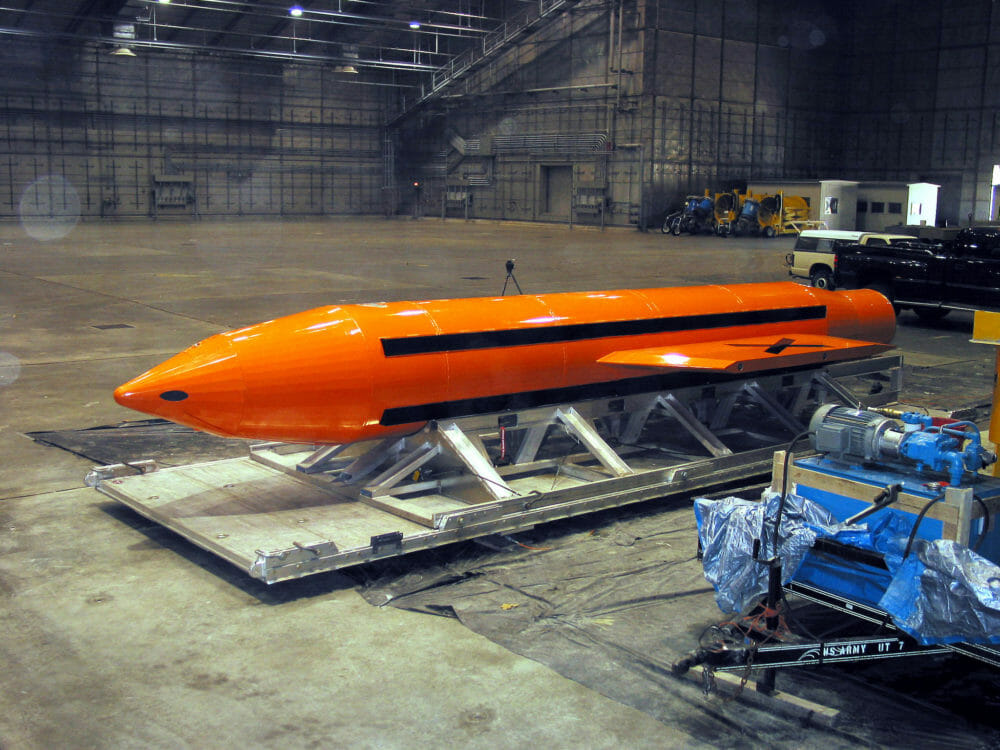Gods of War
The imperial mindset of the bomber With Trump, aerial bombing has returned to its imperial roots. / National Museum of the U.S. Navy.
With Trump, aerial bombing has returned to its imperial roots. / National Museum of the U.S. Navy. o
l
u
m
n
s
When the Bengali poet Rabindranath Tagore flew in 1932 from Calcutta to Bushehr in Iran, he made a brief stop in Baghdad. It was a long journey, and although Tagore was extremely well traveled, this was only his second time on an aircraft. Seventy-one years old, curious about the world but critical of the violence and rigidity of modernity, Tagore was mostly unimpressed by his experience of commercial aviation. It brought to mind the mythical account in the Mahabharata of the warrior Arjuna being taken up into the air, making him reflect that Arjuna had lost intimacy with the earth by flying, his physical distancing resulting inevitably in a moral distancing that would allow him to kill from the air with-out compunction.
It was a thought only confirmed for Tagore in Baghdad, where he was told by the chaplain of the Royal Air Force that British aircraft were bombing an Iraqi village. Tagore was appalled by this. It appeared to him that aerial bombing was exceptionally immoral even by the standards of modern warfare. “Killing them from aircrafts is so easy, with so little fear of being killed in return, that the reality of killing becomes faint,” he wrote in his account of his travels, but in this, as in most matters, Tagore was struggling against the dominant tide of modernity.
Bombing seemed to the political and military establishment in Britain like a terrific return on its investment.
The British, in fact, inaugurated the practice of dropping bombs on restive native populations in the very region Tagore was passing through. Facing a rebellion in Iraq in the 1920s, the Royal Air Force inaugurated what it called “aerial policing,” eager to use superior western technology against its enemies. With 9,000 Iraqis killed for the loss of nine men on the British side, it seemed to the political and military establishment in Britain like a terrific return on its investment. Winston Churchill, whose ghoulish bust has recently returned to the White House, was one of those much impressed by the practice of aerial bombing, wanting to take things a step further by declaring himself to be “strongly in favor of using poison gas against uncivilized tribes.”
From there to the killing skies of the Second World War, it was a smooth transition. “The Arab and Kurd now know what real bombing means,” the RAF officer Arthur Harris had noted in 1924 while initiating “area bombing” in Iraq, and Harris eagerly imparted similar knowledge to German civilian populations when the chance came. But every major power had worked fervently to own a piece of this new mode of violence, the Axis forces as much as the Allies, so that many of the defining images of that long war—London during the Blitz, Dresden as it was fire bombed, or Hiroshima and Nagasaki where aerial bombing was taken to its logical conclusion of complete extinction of life—involve destruction visited from the air upon terrified civilian populations.
Yet there was one major difference involved in deploying what had begun as a method of colonial policing upon modernized, mostly western, nations that were themselves colonial powers. Unlike the dropping of bombs on native populations in Iraq and Afghanistan, unlike even the bombs unleashed on Spanish Republican forces in Guernica in 1937 by the Hitler-Franco-Mussolini combine, the fight between Allied and Axis powers involved significant danger to the bomber crews. It was this danger, resulting from enemy fighter attacks and anti-aircraft fire, that the press had in mind when it RAF personnel had in mind?when they called Harris, named “Bomber Harris” by an admiring press, “Butcher Harris.”
The American poet, Randall Jarrell, who served as an observer in the U.S. air force during the war, memorialized one of the horrifying possibilities in his haunting poem, “Death of the Ball-Turret Gunner”:
From my mother’s sleep I fell into the State,
And I hunched in its belly till my wet fur froze.
Six miles from earth, loosed from its dream of life,
I woke to black flak and the nightmare fighters.
When I died they washed me out of the turret with a hose.
Tagore would have approved. In spite of starting from a very different place, Jarrell had arrived at the same understanding of the dehumanized nature of aerial warfare—its eldritch, nightmarish reversal of the safety of the womb, its inversion of life into death, and, in what might be the most gruesome image in the poem, its transformation of death itself into a problem of sanitation.
But such insight disappeared over the decades after the Second World War as aerial bombing returned to its imperial roots. The lavish use of napalm and Agent Orange by the U.S. air force in Vietnam and Cambodia in the sixties and seventies marked the beginning of that change, especially as, in the decades after the end of the Cold War, the ferocious internal critics of the Vietnam War were airbrushed out of history or turned, as the U.S. military did with Martin Luther King Jr., into a recruiting agent for violence.
The power differential the bomber?expressed captures the reach of imperialism better than the gunboat or warship favored in the nineteenth century.
It seems ironic that the bomber aircraft, its crews now sealed off from harm, grew in popularity after the Second World War, when the world had supposedly moved on from old-school colonialism. Yet the power differential the bomber expressed captures the long reach of imperialism far better than the gunboat or warship favored in the nineteenth century. Today, the bomber or its variants—fighter aircrafts, missiles, or drones—appeals to anyone and everyone for whom the reality of killing is faint. This is true of the Syrian president Bashar al-Assad dispatching his airplanes to release poison gas in Syria as well as of the technocratic-minded Al Qaeda members who converted civilian aircraft into weapons during the attacks of 9/11.
The technological leap offered by drones in recent years has only emphasized the gap between killing and not being killed, with the operator twice removed from the death being visited upon distant human beings. It says something about the deep psychology of modern political formations that Barack Obama’s neoliberalism, with its Davos–Silicon Valley approach to the world, embraced drones, while Donald Trump’s racist authoritarianism harks back to more old-fashioned ways in dropping the largest non-nuclear bomb, the MOAB, on Afghanistan. The difference, for all that, is slight. Death from above, visited upon those with little or no capacity of retaliation, expresses the delusion of people who, having lost all touch with humanity, think of themselves as gods.




















